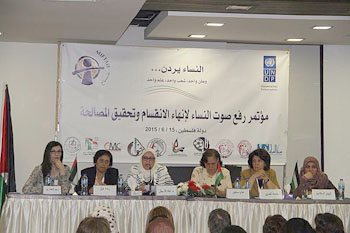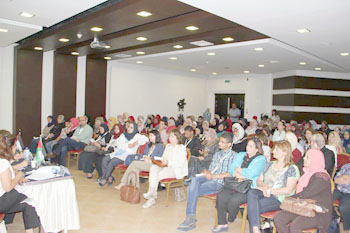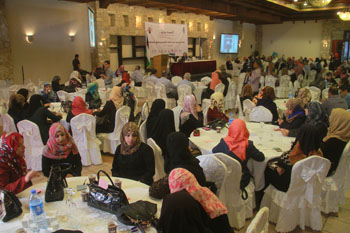Women press demand for Palestinian unity

‘Women’s Call: One Country, One People, One Flag’
Miftah conference demands an immediate restoration of national unity and popular action to end the political division. Participants of the “Women’s Call: One Country, One People, One Flag” conference organized by MIFTAH and a group of civil society organizations in cooperation with UNDP, called for immediate achievement of national reconciliation through a full and immediate implementation of the Cairo Agreement for National Reconciliation and in accordance with the ‘Shati’ Agreement.
By MIFTAH
June 24, 2015
RAMALLAH: The Agreement called for the formation of a consensus government and considered it as a step towards ending the divide and paving the way for presidential and legislative elections ‘in six months’, for setting a date for presidential, legislative and Palestinian National Council (PNC) elections.The conference was held in Ramallah concomitantly with Gaza through video conferencing and was attended by hundreds of activists and leaders from various national and Islamic factions.
First priority: regaining national unity
The closing statement, read by Najwa Yaghi/MIFTAH, reaffirmed the priority of regaining national unity as a basis for ending the Israeli occupation; the ‘shortcut’ to Gaza’s reconstruction and to breaking Israel’s siege on the Strip. This the statement highlighted, meant the national unity government must be able to assume its responsibilities and duties in Gaza and that all obstacles in its way must be removed.
The statement also stressed on the need for achieving a social contract based on the concept of citizenship and the recognition of women’s rights in political participation based on the Palestinian Declaration of Independence and the Palestinian women’s rights document ratified by all women’s movements in Palestine. Furthermore, the statement called for a halt to all practices and measures that harm the social fabric including political arrests and summons, torture and the closure of unions and associations.
A movement for peaceful and popular pressure

The women at the conference from the various parties and organizations all pushed for the organization of a movement for peaceful and popular pressure under the name of “Women are able to regain unity, get the Palestinian house in order and guarantee freedoms.” This pressure movement would also be to the benefit of Palestinian prisoners and for forming a national body for released prisoners who could participate in this social pressure to end the division.
The statement called on the General Union of Palestinian Women and women’s institutions to formulate a plan to mobilize Palestinian women and educate them on methods of peacefully resolving internal conflicts in order to develop peaceful action in addressing the political division.
Legal support for women
Participants called on legal and women’s institutions to provide legal support towards safeguarding women against all forms of violence. Additionally, they called for ending all disputes that have arisen in Palestinian society on the backdrop of the division along with unifying security, civil and sovereign institutions.
Political pluralism

The closing statement confirmed the necessity for political pluralism in society and the participation of all, first and foremost women, in the building and development process, and for all to live in freedom and dignity according to the law. In particular, it called for an end to the negative media exchanges and to adopt responsible media discourse that advocates for national unity. Here, the statement reiterated the importance of local media in promoting the values of tolerance and freedom of opinion and expression and in forming public opinion that pushes towards ending the division. It called for investing in interactive methods for change and expression of national and social issues and for shunning division, discrimination and factionalism.
Spreading concepts of tolerance
The women’s parties and civil society institutions also urged that no platform be allowed to anyone who feeds into the culture of division and intolerance. The women advocated for mainstreaming the concepts of tolerance in the curriculum and for advancing the capacities of the Ministry of Education on ways of inserting the concepts of reconciliation and tolerance in the educational processes in order to create generations who believe in pluralism and acceptance of the other. They called for creating a forum for national dialogue that includes all factions and political organizations, social forces and components of the women’s movement.
In this regard, the conference organizers decided to form a committee to follow up the implementation of its recommendations.
Dr. Lily Feidy: Raising women’s voices
In her opening address to the conference, MIFTAH CEO Dr. Lily Feidy said: “We can no longer remain silent over the political division, which has compounded our people’s suffering.” She pointed to the negative media exchanges and political bickering going on at a time when our people should be standing against the crimes of the occupation. “The pace of these attacks has risen since the start of the division, namely the latest offensive by the Israeli occupation on Gaza, for which women paid a heavy price.” Feidy also pointed out that the division contributed to an increase in violence against women and children. Hence, she said all women’s organizations and bodies must raise their voices against this division and demand national reconciliation, the implementation of the Cairo Agreement, holding democratic elections and achieving social reconciliation.
Intisar Al Wazir: Formation of initiatives and national campaigns
On her part, head of the General Union of Palestinian Women, Intisar Al-Wazir said Palestinian women must raise their voices against the division in order to ensure that society realizes how dangerous it is. “The political division has weakened the Palestinian negotiating position and has drained us of our energies, which have gone into this division instead of fighting the occupation.”
Al-Wazir went on to say that the political division has generated much frustration among our people, adding that if it continues, it will also strip women of many accomplishments. She noted that it has led to an increase in violence against women in addition to other components in society such as journalists.
Al-Wazir called for efforts to end the division by removing the obstacles in the way of achieving it. She also called or the reconstruction of Gaza, preparations for elections, the reactivation of the PLC, the opening of crossings and for allowing the consensus government to operate in Gaza.
She also called for forming national initiatives and campaigns and continued efforts to safeguard the rights of Palestinian women in addition to supporting their role in ending the division.
Short film on the impact of the division
During the conference, a short film was shown about the social impact of the division on Palestinian citizens.
Working papers and presentations
Prior to the closing statement, two separate workshops were held. The first discussed the impact of the division from a political standpoint, while the second discussed the subject of social reconciliation. In both sessions, working papers were presented by speakers who represented national and Islamic factions, including representatives from the Islamic Jihad and Hamas in addition to Fatah, Popular Front, democratic Front, Palestinian People Party (PPP) and FIDA.
All the presentations were in consensus over the need to end the division and the central role women play in achieving national reconciliation. They focused on the importance of women’s involvement in all reconciliation committees given that they have been the most affected by the division.
Several Palestinian officials who attended the conference, including PLC members, commented on the presentations. DFLP leader Qays Abdel Karim warned against a slippery slope that would ultimately lead to a de facto separation between Gaza and the West Bank. “If we want to get closer to ending the division, we must acknowledge the facts. Hence, we must form a pressure lobby, specifically of women, that will lead us towards ending the division.”
Dr. Hanan Ashrawi: A social contract
PLO Executive Committee member Dr. Hanan Ashrawi proposed something new. “We need to offer something different, to change the status quo” she said. “It is not us women who created the division; it was created by a patriarchal system.” Here she called for a social contract in which women are the primary interveners and the ones who take action to end the division.
Fahmi Shahin: The division serves the occupation
Fahmi Shahin, member of the PPP’s politburo commented: “The division serves no one but the Israeli occupation,” recommending a women-led popular endeavor to end it.
Ahmad Al Ori: Restoring an affiliation and love for Palestine
Islamic Jihad representative, Ahmad Al Ori reaffirmed the role of women in restoring a sense of belonging and love for Palestine. He then called for legislative, presidential and PNC elections and to address all issues pertaining to the division.
